Welcome to our article on the future of live music! In recent years, the music industry has undergone a significant shift towards virtual concerts and VR experiences. As technology continues to evolve, these immersive music experiences are becoming increasingly popular among music lovers around the world.
As we explore the impact of virtual concerts and VR experiences on the future of live music, we’ll discuss the benefits and challenges of this growing trend. We’ll also take a closer look at the different platforms and technologies available for creating immersive music experiences, as well as the potential for revenue generation through virtual concerts.
Key Takeaways
- Virtual concerts and VR experiences are revolutionizing the live music industry.
- Technology has played a significant role in the evolution of live music throughout history.
- Virtual reality technology provides unique and interactive experiences for music lovers.
- Virtual concerts offer accessibility and convenience, as well as the ability to reach a global audience.
- Challenges associated with virtual concerts and VR experiences include latency and bandwidth limitations.
- Virtual music festivals have the potential to reach wider audiences and provide unique experiences.
- Artists and audiences are embracing virtual reality in the live music industry.
- Guidance is needed for artists and industry professionals on navigating the world of virtual concerts and VR experiences.
- The impact of virtual concerts and VR experiences on the music industry presents both opportunities and challenges.
Embracing Technology: The Evolution of Live Music
Innovation has always been at the heart of the music industry. From the invention of the phonograph to the rise of digital music streaming, technology has constantly reshaped the way we consume and experience music. As we look to the future, we can expect even more exciting advancements in the live music space.
One of the most significant developments in recent years has been the introduction of virtual reality technology. With the ability to transport audiences to new worlds and create immersive experiences, VR is revolutionizing the way we think about live music performances.
As virtual reality technology continues to evolve, we can expect to see more and more live music events incorporating this cutting-edge technology. From virtual concert platforms to interactive VR experiences, the possibilities are endless.
Virtual Reality and the Live Music Experience
One of the major advantages of incorporating virtual reality technology into live music performances is the ability to create truly immersive experiences for audiences. With VR, music fans can be transported to incredible new spaces and interact with live music performances in ways they never thought possible.
Another benefit of VR is the ability to create a sense of presence, even for audiences who are unable to attend live performances in person. By donning a VR headset, fans can feel as though they are truly a part of the performance, regardless of their physical location. This opens up new opportunities for artists to reach fans all over the world.
As the technology continues to improve, we can expect to see even more innovative uses of VR in the live music space. From incorporating augmented reality elements into performances to creating fully immersive virtual music festivals, the potential for virtual reality in the music industry is truly limitless.
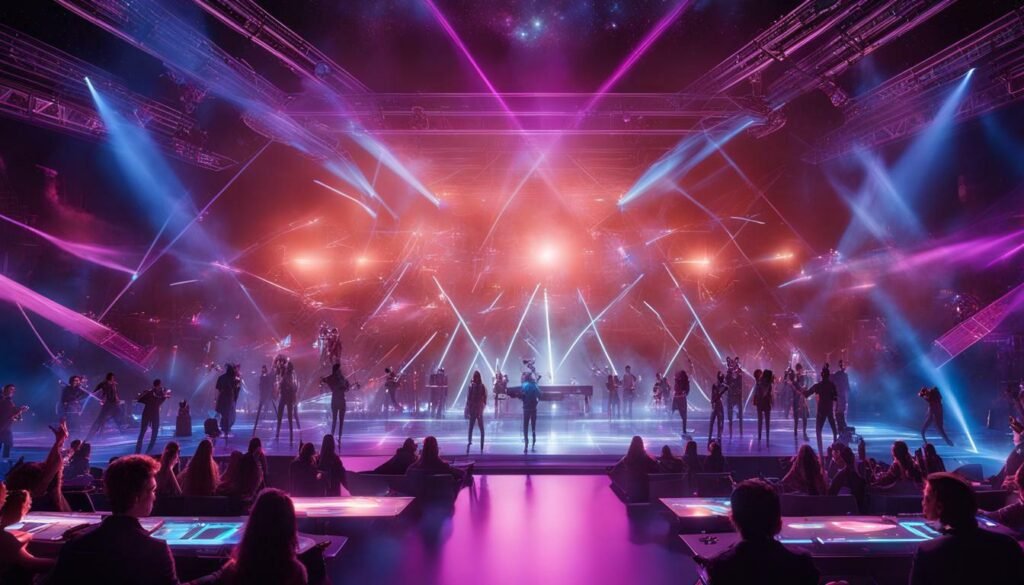
“With the ability to create immersive experiences, VR is revolutionizing the way we think about live music performances.”
An Immersive Experience: Virtual Concerts and VR Technology
The world of virtual concerts and VR technology provides a unique and immersive experience for music lovers. Virtual concert platforms offer a range of exciting features that enhance the music experience and transport the audience to different locations and environments.
One such platform is MelodyVR, which provides virtual reality concerts featuring top artists from around the world. The platform uses cutting-edge VR technology to create an immersive concert experience that allows fans to feel as though they are front-row center at a live performance. Using a headset, fans can enjoy 360-degree views of the concert and even change their perspective by moving their head or position.
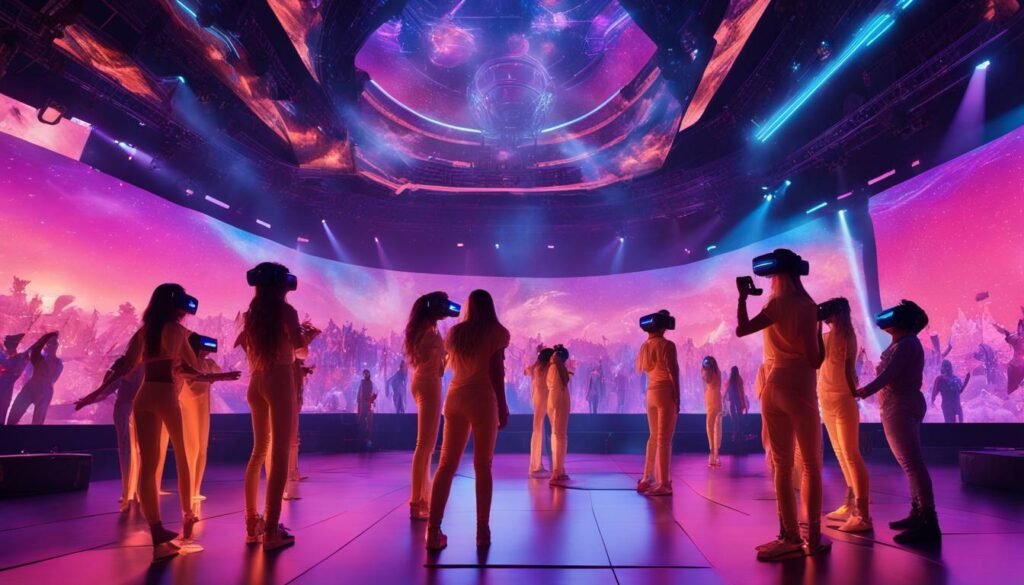
In addition to virtual concerts, VR technology is being used to create interactive music experiences. Platforms like TheWaveVR allow users to participate in live VR concerts and music festivals, offering a truly immersive and interactive experience. Attendees can create their own avatars, interact with others, and even interact with the music itself through visual and audio effects.
As VR technology continues to evolve, we can expect even more innovative virtual concert platforms and interactive music experiences to emerge. These developments will provide artists and audiences with new opportunities to connect and engage with music on a deeper level.
The Benefits of Virtual Concerts and VR Experiences
Virtual concerts and VR experiences are not just an exciting new trend, but also offer a wide range of benefits for both artists and audiences. Let’s take a closer look at some of these advantages:
-
Increased Accessibility
Virtual concerts and VR experiences make it possible for fans to attend live music events from anywhere in the world. This increased accessibility means that artists are able to reach a much larger audience than ever before, breaking down geographical barriers and expanding their fanbase.
-
Convenience
Virtual concerts and VR experiences are also incredibly convenient for audiences. No longer do fans have to battle traffic, crowds, or poor weather conditions to attend a live music event. Instead, they can simply log onto their computer or VR headset and enjoy the show from the comfort of their own home.
-
New Revenue Streams
Virtual concerts and VR experiences also offer new revenue streams for artists. By charging a fee for virtual access, they can reach a global audience and generate income without the overhead costs of traditional live music events.
-
Creative Opportunities
Virtual concerts and VR experiences provide artists with new creative opportunities to experiment with their music and performances. With the ability to incorporate interactive elements, 360-degree visuals, and other innovative features, artists can create truly unique and unforgettable experiences for their audiences.
While there are certainly challenges associated with virtual concerts and VR experiences, the benefits and opportunities they offer are too significant to ignore.
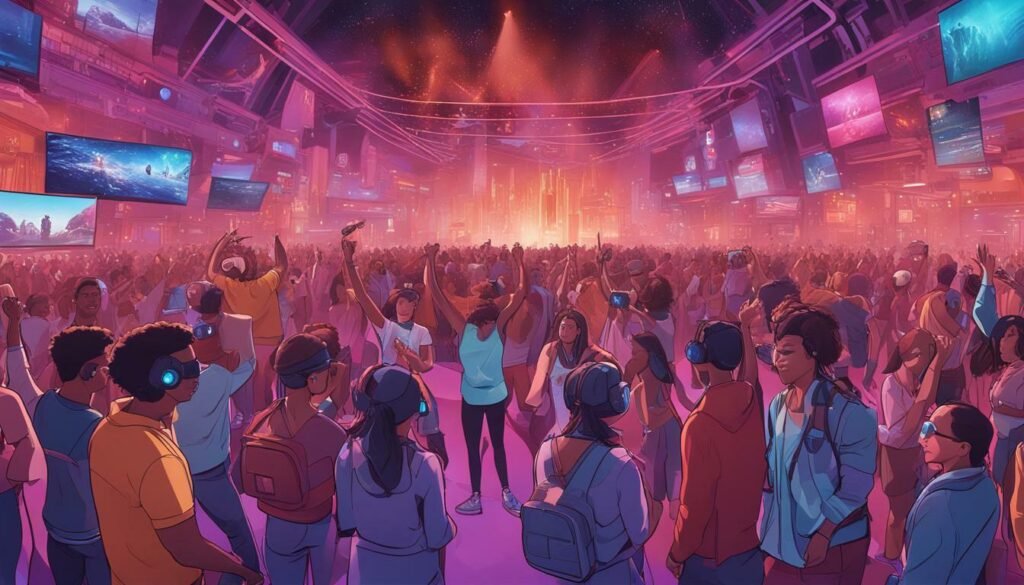
Overcoming Challenges: Virtual Concerts and VR Experiences
While there are many benefits to virtual concerts and VR experiences, there are also challenges that must be addressed. One of the biggest challenges is technology limitations, specifically issues with latency and bandwidth. As virtual concerts and VR experiences require a significant amount of data to be transmitted in real time, slow internet speeds or network latency can cause lag and disrupt the experience.
Another challenge is the need for investment in VR infrastructure. Currently, many virtual concert platforms are experimental and lack the necessary infrastructure to support large-scale events. This can result in technical glitches and poor user experiences, which can turn off audiences and deter artists from pursuing virtual concerts.
Despite these challenges, industry professionals are working to create solutions to ensure a seamless and high-quality experience for virtual concerts and VR experiences. This includes developing new technologies to reduce latency and investing in infrastructure to support large-scale events.
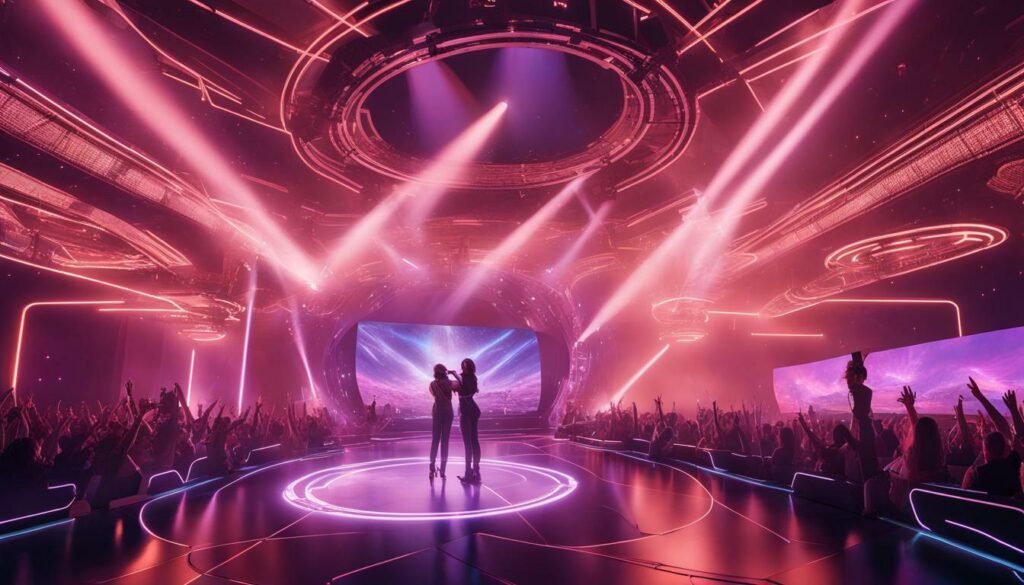
We believe that with the right investments and developments, virtual concerts and VR experiences have the potential to revolutionize the live music industry. While there may be challenges to overcome, we are excited about the possibilities and look forward to seeing how the industry adapts to this new era of music entertainment.
Revolutionizing Music Festivals: The Rise of Virtual Events
Virtual music festivals are transforming the way we experience live music. In the wake of canceled live events due to the COVID-19 pandemic, virtual music festivals have become increasingly popular, providing music lovers with a unique and innovative way to enjoy their favorite artists from the comfort of their own homes.
Despite the initial challenge of transitioning from traditional live events to virtual ones, the benefits of virtual music festivals cannot be ignored. They offer the opportunity to reach a wider audience, connect with fans around the world, and provide a cost-effective alternative to traditional live events.
Moreover, virtual music festivals allow for greater creativity and innovation in the way live music is presented. VR technology allows for immersive experiences that can transport audiences to new and exciting worlds, and can incorporate new artistic elements such as augmented reality, holograms, and interactive visuals.
| Benefits of Virtual Music Festivals |
|---|
| 1. Increased accessibility |
| 2. Greater audience reach |
| 3. Cost-effective alternative to traditional live events |
| 4. Creative freedom for artists and organizers |
| 5. Incorporation of innovative technology |
With the rise of virtual music festivals, the future of live music is evolving. As technology continues to advance, we can expect to see even more innovative virtual experiences that push the boundaries of what we thought was possible in the realm of live music.
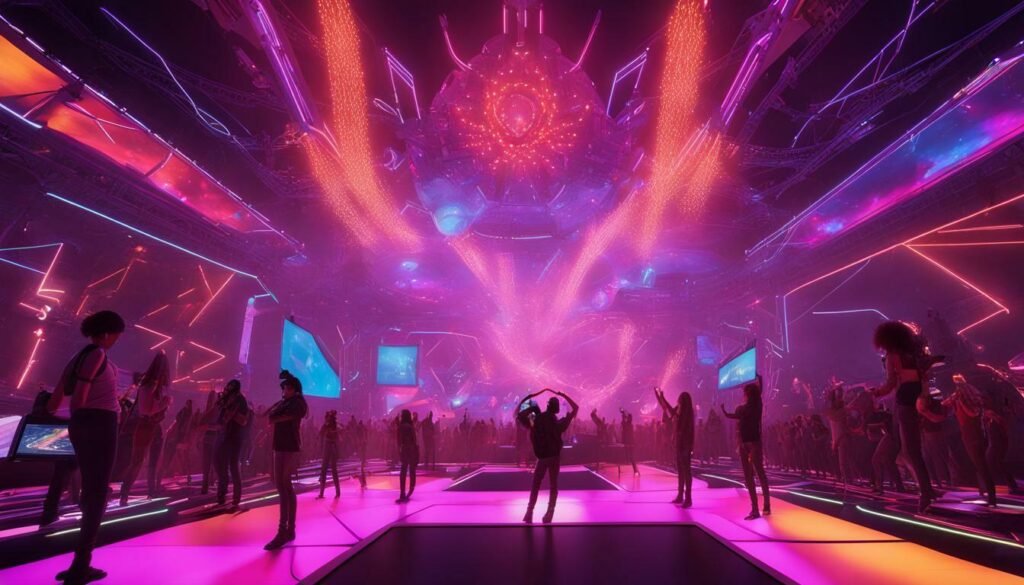
As we continue to navigate this new era of live music entertainment, it’s important that we embrace virtual music festivals, recognizing the opportunity they provide for both artists and audiences. By doing so, we can ensure that live music remains accessible, creative, and innovative, shaping the future of the music industry for years to come.
The Future of Live Music: Virtual Reality Innovations
As technology continues to evolve at a rapid pace, the possibilities for virtual reality innovations in the world of live music are endless. Virtual concerts and VR experiences have already shown their potential to revolutionize the way music is experienced, but the future promises even more exciting developments.
Augmented Reality and Live Performances
One area of innovation that could significantly transform the live music experience is the incorporation of augmented reality elements into performances. Imagine watching a live concert with the addition of stunning visual effects that enhance the music and immerse the audience even further into the experience. This technology has the potential to create a truly unforgettable and unique performance.
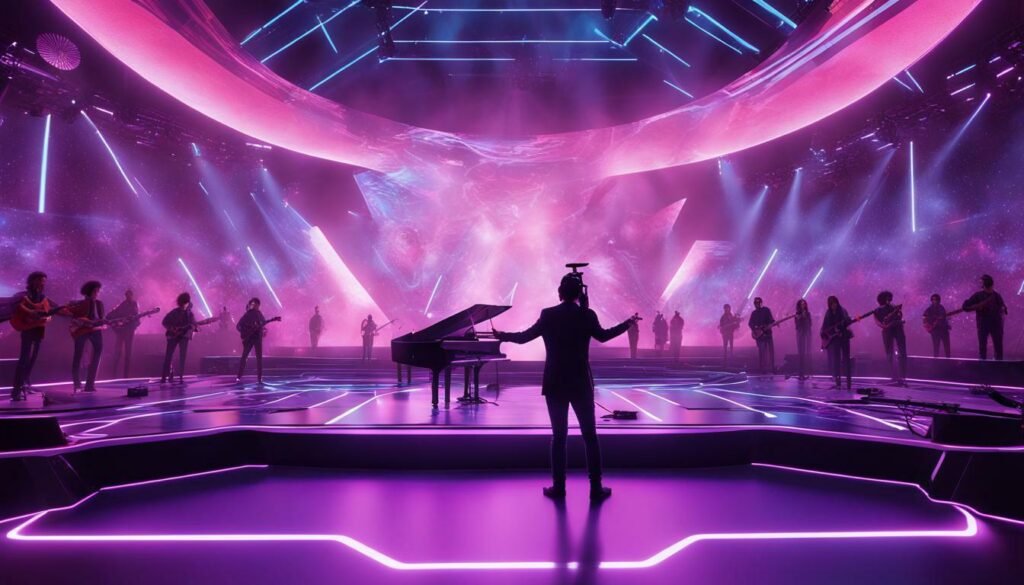
Collaborations between Artists and Technology Companies
A collaboration between artists and technology companies could also lead to the creation of innovative virtual reality experiences that push the boundaries of what is possible in live music. The potential for interactive performances and immersive experiences is vast, and artists and technology companies have the opportunity to work together to create something truly extraordinary.
The Future of Live Music
As we look ahead to the future of live music, it’s clear that virtual reality innovations will play a significant role in shaping the industry. While there are certainly challenges and limitations to be addressed, the potential benefits of virtual concerts and VR experiences are too great to ignore. By embracing these new technologies and pushing the boundaries of what is possible, the music industry has the opportunity to provide audiences with truly unforgettable and immersive music experiences for years to come.
Embracing Virtual Reality: Artists and Audiences
As virtual concerts and VR experiences continue to gain momentum, artists and audiences are eagerly embracing the new era of live music. With the ability to connect with fans across the globe and explore new creative avenues, virtual concerts have become a valuable resource for musicians.
Artists are taking advantage of the immersive experience that virtual reality provides, using it to create unforgettable performances for their fans. From incorporating interactive elements to experimenting with new visual effects, artists are pushing the boundaries of what is possible with virtual concerts.
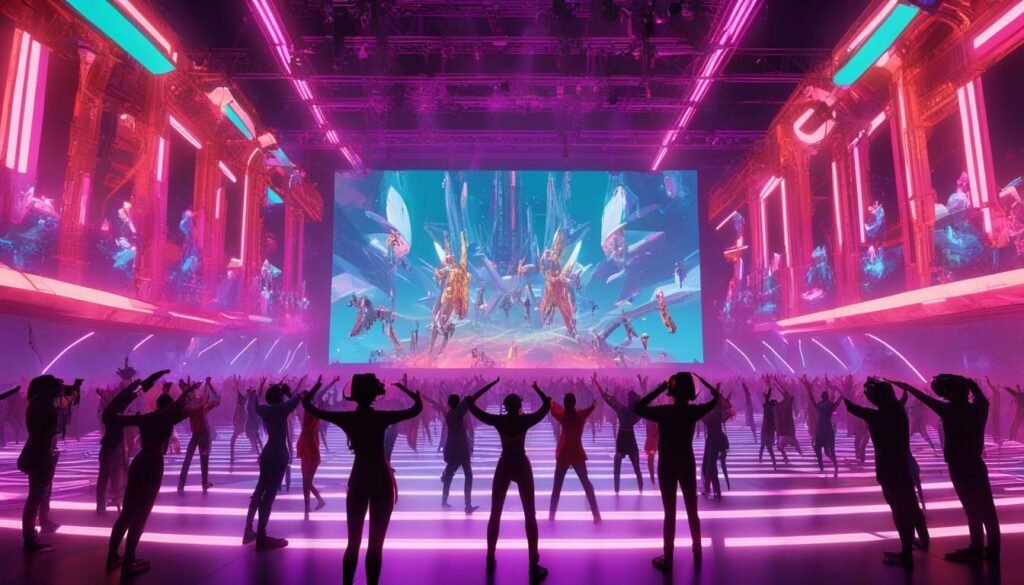
Audiences are equally enthusiastic about the potential of virtual concerts and VR experiences. With the convenience of being able to attend a concert from home, fans are able to access a wider range of live music performances. Virtual concerts also offer a unique opportunity for fans to experience their favorite artists in an entirely new way, providing a deeper connection to the music and the performer.
Overall, virtual concerts and VR experiences are transforming the way artists and audiences interact with live music. As more musicians and industry professionals begin to embrace the potential of this technology, we can expect to see a continued evolution of the live music experience.
Virtual Concerts: The Roadmap for Artists and Industry Professionals
As technology continues to shape the future of live music, virtual concerts and VR experiences have become an exciting area of exploration for artists and industry professionals. Whether you’re a seasoned performer or just starting in the industry, navigating the world of virtual concerts can be daunting. To help you get started, we’ve put together a roadmap for virtual concerts, outlining the key considerations for artists and industry professionals.
Understanding the Technology
Virtual concerts and VR experiences rely on the latest technology to create immersive music experiences for audiences. It’s essential for artists and industry professionals to have a solid understanding of the technology involved in virtual concerts, including the different platforms and technologies available for creating immersive music experiences. This will help you to choose the right platform for your virtual performance and ensure that you can deliver a high-quality experience for your audience.
Choosing the Right Platform
Choosing the right platform for your virtual concert is crucial for delivering a high-quality experience for your audience. There are now a variety of virtual concert platforms available, each with their own unique features and capabilities. It’s important to choose a platform that aligns with your goals and target audience, and that can deliver the level of immersion and interactivity you’re looking for.
Some popular virtual concert platforms include WaveXR, MelodyVR, and Sansar. Each of these platforms offers unique features and capabilities, such as interactive avatars and virtual worlds, that can enhance the virtual concert experience for audiences.
Marketing and Monetization Strategies
Virtual concerts offer a range of exciting opportunities for artists and industry professionals, including the potential for reaching global audiences and generating revenue. However, it’s essential to have a solid marketing and monetization strategy in place to ensure the success of your virtual concert.
Effective marketing strategies for virtual concerts can include social media promotion, email marketing, and collaboration with influencers or other artists. Monetization strategies can include ticket sales, merchandise sales, and sponsorships or partnerships with brands or companies. It’s important to consider the unique challenges and opportunities of virtual concerts and develop a strategy that aligns with your goals and target audience.
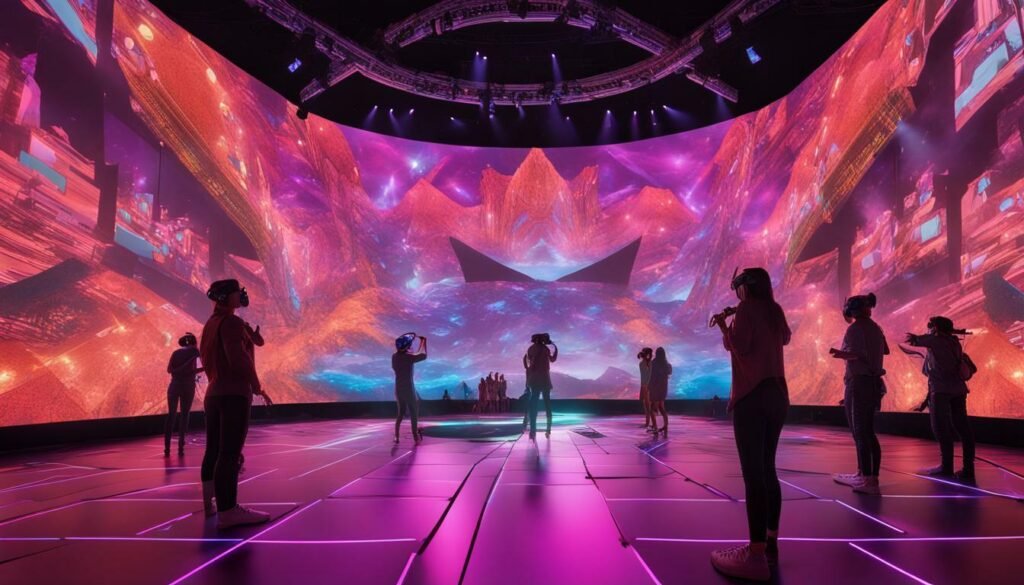
Virtual concerts and VR experiences are transforming the live music industry, providing new opportunities for artists and industry professionals to connect with audiences and deliver unique and immersive music experiences. By understanding the technology, choosing the right platform, and developing effective marketing and monetization strategies, artists and industry professionals can navigate the world of virtual concerts with confidence and creativity.
The Impact on the Music Industry: Opportunities and Challenges
Virtual concerts and VR experiences are poised to revolutionize the music industry, offering new opportunities for revenue generation and expanding the reach of live music performances. While this technology presents exciting possibilities, it also poses challenges for industry professionals to navigate.
One of the key opportunities presented by virtual concerts and VR experiences is the ability to reach a global audience. With virtual platforms, artists can connect with fans anywhere in the world, allowing for greater exposure and potential for new revenue streams. Additionally, virtual concerts offer a level of accessibility and convenience that traditional live shows cannot match. Fans who may not have been able to attend in-person concerts due to financial or geographical barriers can now experience the excitement of live music from the comfort of their own home.
However, there are also challenges that must be addressed in order to fully utilize this technology. Latency and bandwidth issues can impact the quality of virtual concerts, creating a less-than-optimal experience for fans. Additionally, there is a need for significant investment in VR infrastructure to ensure a seamless and high-quality immersive experience for audiences. As the technology continues to advance, these challenges may be overcome, but it will take time and resources to do so.
The rise of virtual concerts and VR experiences also has the potential to disrupt traditional live music events. While virtual events can offer many advantages, there is no substitute for the visceral experience of attending a live show. The music industry must find a way to balance the benefits of virtual concerts with the importance of preserving the live music experience.
Overall, the impact of virtual concerts and VR experiences on the music industry remains to be seen. While there are challenges to be addressed, the potential for revenue generation and reaching new audiences is significant. As the industry continues to evolve, it is crucial that artists and industry professionals remain open to experimentation and innovation in order to fully embrace the future of music entertainment.
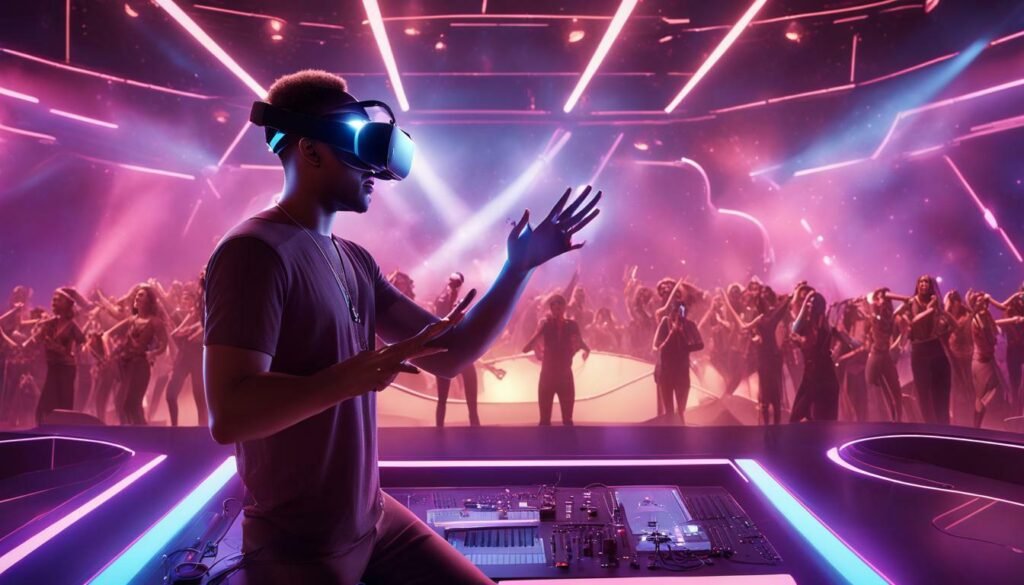
Conclusion
In conclusion, virtual concerts and VR experiences are shaping the future of live music. As technology continues to evolve, the music industry must embrace these innovations to provide unique and immersive experiences for audiences.
The accessibility and convenience of virtual concerts allow artists to reach a global audience and generate revenue. However, there are also challenges that need to be addressed, such as issues with latency and the need for investment in VR infrastructure.
Virtual music festivals offer exciting opportunities for collaboration between artists and technology companies to create unforgettable experiences. As the industry continues to experiment with augmented reality elements, we can expect to see even more innovative developments in the future.
The Road Ahead for Artists and Industry Professionals
For artists and industry professionals, understanding the technology and choosing the right platforms for virtual performances is essential. Developing marketing and monetization strategies will also be crucial for success in this new era of music entertainment.
As virtual concerts and VR experiences become more prevalent, the music industry must adapt to ensure that traditional live music events remain relevant. While there are challenges ahead, we believe that the potential benefits of virtual concerts and VR experiences are too compelling to ignore.
Overall, we are excited to see how the music industry will continue to incorporate virtual reality technology into live music performances and create unforgettable experiences for audiences worldwide.
FAQ
Q: What are virtual concerts and VR experiences?
A: Virtual concerts are live music performances that take place in a digital environment, allowing audiences to watch and interact with the show from the comfort of their own homes. VR experiences refer to immersive virtual reality technology that enhances the concert experience by providing a 360-degree view and a sense of presence.
Q: How do virtual concerts and VR experiences revolutionize the live music industry?
A: Virtual concerts and VR experiences introduce new possibilities for live music by breaking down geographical barriers and allowing artists to reach a global audience. They also provide a unique and immersive experience for music lovers, bringing them closer to the stage and creating a sense of presence and interactivity.
Q: What are the benefits of virtual concerts and VR experiences?
A: Virtual concerts and VR experiences offer numerous benefits for both artists and audiences. For artists, they provide the opportunity to connect with fans on a global scale, expand their reach, and generate revenue through ticket sales and merchandise. For audiences, virtual concerts offer convenience and accessibility, allowing them to enjoy live music from anywhere in the world.
Q: What challenges are associated with virtual concerts and VR experiences?
A: Virtual concerts and VR experiences face challenges related to technology, such as issues with latency and bandwidth that can affect the quality of the audio and visual experience. There is also a need for investment in VR infrastructure to ensure a seamless and high-quality experience for both artists and audiences.
Q: How are virtual music festivals transforming the live music industry?
A: Virtual music festivals have the potential to reach a wider audience and provide unique experiences that traditional festivals cannot offer. They allow for collaboration between artists and technology companies to create unforgettable virtual festival experiences, bringing together music, visuals, and interactive elements.
Q: What future developments can we expect in virtual reality technology for live music?
A: In the future, we can expect to see advancements in virtual reality technology, including the incorporation of augmented reality elements into live performances. These innovations have the potential to further enhance the immersive and interactive nature of virtual concerts and create new possibilities for live music experiences.
Q: How are artists and audiences embracing virtual reality in the live music industry?
A: Artists are utilizing virtual concerts to connect with their fans, explore new creative avenues, and experiment with innovative concepts. Audiences are enthusiastic about immersive music experiences and are embracing virtual reality as a way to enhance their enjoyment of live music performances.
Q: What guidance is available for artists and industry professionals navigating virtual concerts and VR experiences?
A: It is important for artists and industry professionals to understand the technology behind virtual concerts and VR experiences. Choosing the right platforms for virtual performances, creating marketing strategies, and exploring monetization opportunities are key considerations when entering this new era of live music.
Q: What is the potential impact of virtual concerts and VR experiences on the music industry?
A: Virtual concerts and VR experiences have the potential to generate revenue, reach new audiences, and provide exciting opportunities for artists and industry professionals. However, they also present challenges and may disrupt traditional live music events, requiring adaptation and innovation within the music industry.
Q: What is the conclusion regarding virtual concerts and VR experiences?
A: Virtual concerts and VR experiences have the potential to shape the future of live music by offering unique and immersive experiences for both artists and audiences. With advancements in technology and continued innovation, this new era of music entertainment holds exciting opportunities and possibilities for the music industry.

